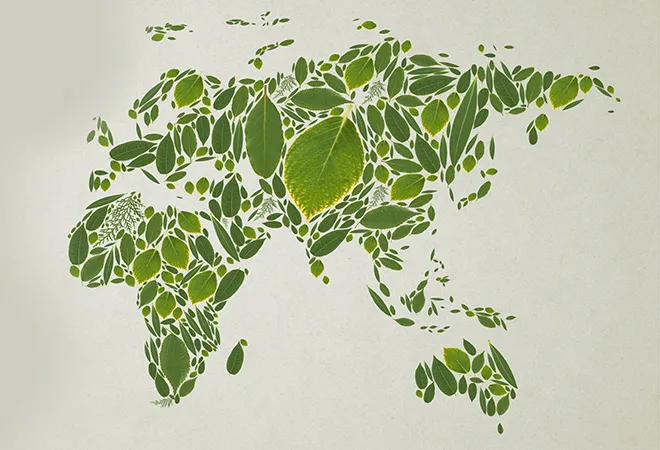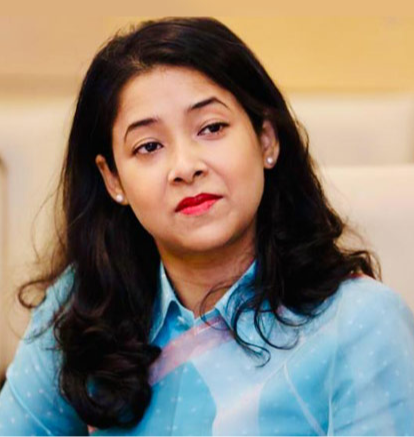
Founded on shared economic interests and long-standing historical ties, there are few partnerships as significant as the one between India and Africa. As the global economy’s two most important growth poles, both India and African nations have made great strides in development over the last decade. They are the fastest growing regions in the world, yet are also the most vulnerable to climate change. Their vulnerability is further compounded by a lack of energy access and security, required to sustain their growth trajectories. The intersection between common developmental goals and realisation of the need to conduct economic transitions in a climate-constraint world has fostered an ‘
India- Africa Partnership for Sustainability.’
However, the Covid pandemic has affected the development aspirations and growth trajectories of these important economies. The exact scale of the economic and social crisis is difficult to predict. However, a recession – perhaps of record dimensions – is a near certainty. As nations begin to direct all resources towards addressing the post-pandemic economic crisis, experts fear that the response to pandemic is likely to take away the political attention and economic commitment required towards the implementation of Sustainable Development Goals (SDGs) and the global response to climate change. There have also been calls to radically re-imagine the post-Covid world as one that is more resilient and climate friendly. The way India and Africa navigate their development agenda in the aftermath of the Covid crisis will prove to be critical.
Especially to the developing countries in Africa and India, the pandemic has demonstrated more than ever before how critical the core aspects of the SDG agenda such as energy access and most importantly, climate action, are to crisis response and resilience as economies.
Both India and Africa are energy scarce. Inadequate energy infrastructures in many regions of these economies have caused grave concern over the eventual scale and impact of the pandemic. Access to sustainable electricity, such as during this pandemic, is necessary to communicate with public services and ensure that medical equipment and medicines are fully functional.
Both India and Africa are energy scarce. Inadequate energy infrastructures in many regions of these economies have caused grave concern over the eventual scale and impact of the pandemic. Access to sustainable electricity, such as during this pandemic, is necessary to communicate with public services and ensure that medical equipment and medicines are fully functional.
According to the World Bank, 600 million people in sub-Saharan Africa and 200 million people in India still live without electricity. India’s energy consumption is set to grow 4.2% a year by 2035 -faster among all major economies. The global energy demand of India is expected to double from 5% in 2016 to 11% by 2040, whereas that of Africa will triple by 2030. Fossil fuel sources such as coal is projected to meet just half of this new energy demand. The speed of deployment of renewable energy solutions to meet the energy supply gap will remain critical for these economies.
While India has made considerable strides in renewable energy, it remains heavily depended on fossil fuel sources for its energy requirement. By 2040, the power sector is projected to be responsible for nearly 80 percent of India’s total carbon emissions. On the other hand, Africa’s natural progression towards development, urbanisation and industrialisation will further constrain the already strained energy resources. Covid has exposed fundamental weaknesses in the conventional value chains- production, trade, supply, logistics and businesses- and its consequent impact on energy security. For developing economies that have limited financial reserves, pre-existing energy challenges, and are heavily import depended for their energy needs, the situation is particularly bleak. Therefore for India and Africa, progress towards low-carbon, sustainable, reliable and affordable energy access, is not just an option but an imperative.
While India has made considerable strides in renewable energy, it remains heavily depended on fossil fuel sources for its energy requirement. By 2040, the power sector is projected to be responsible for nearly 80 percent of India’s total carbon emissions. On the other hand, Africa’s natural progression towards development, urbanisation and industrialisation will further constrain the already strained energy resources
India especially has a significant role to play in aiding this transition. In the post-Covid recovery, India does not just have an opportunity but a responsibility to accelerate the inevitable and urgently-required shift to a low-carbon, resilient, regenerative economy, and create a new green development model for the emerging economies in Africa to adopt. A political and economic agenda that champions and facilitates a green stimulus post-Covid will inevitably catalyse the systemic change that is urgently required to build resilience of the economies from greater uncertain future development risks such as climate change. As the economies seek to recover from the impact of the pandemic, India must offer the developing world a shining example of how stronger climate actions could be successfully aligned with development imperatives.
Given India’s present leadership impasse in global climate governance, Africa and other members of the developing world would be keenly following how India leverages its influence at the international stage in key post-pandemic forums such as the G20 and COP26 and push for climate action and sustainable development agenda while simultaneously addressing economic recovery.
However, most importantly the scale of transformations required for developing in a sustainable pathway especially after the pandemic would depend on sound partnerships. India and Africa have already made prominent cooperation in areas of sustainable development and climate action. India through the International Solar Alliance, has pledged a concessional credit line of US$2 billion to Africa over five years for the implementation of off-grid solar energy projects and partnered with the African Development Bank to develop 10,000 MW of solar power systems across the Sahel aimed at providing electricity to approximately half of the 600 million Africans who remain off-grid. The India-Africa Science and Technology initiative aims to share technological know-how to African institutions engaged in research and development. Additionally, India has signed agreements of over 74 joint projects with South Africa, Tunisia, Egypt and Mauritius, to address common development challenges in the renewable energy and agriculture sectors.
While these are commendable, yet there remains significant areas of opportunities for India and Africa to work together. The post-pandemic world has especially posed greater challenges in achieving the objectives of sustainable development and energy transition in these economies. The alignment of India’s sustainable development agenda and Africa’s Vision 2063 offer a framework that can unleash significant possibilities for an enhanced multi-sectoral, multi-stakeholder partnership in a post- Covid world that will be critical in determining not just the future of the two geographies, but the world at large.
There remains significant areas of opportunities for India and Africa to work together. The post-pandemic world has especially posed greater challenges in achieving the objectives of sustainable development and energy transition in these economies
The views expressed above belong to the author(s). ORF research and analyses now available on Telegram! Click here to access our curated content — blogs, longforms and interviews.
 Founded on shared economic interests and long-standing historical ties, there are few partnerships as significant as the one between India and Africa. As the global economy’s two most important growth poles, both India and African nations have made great strides in development over the last decade. They are the fastest growing regions in the world, yet are also the most vulnerable to climate change. Their vulnerability is further compounded by a lack of energy access and security, required to sustain their growth trajectories. The intersection between common developmental goals and realisation of the need to conduct economic transitions in a climate-constraint world has fostered an ‘India- Africa Partnership for Sustainability.’
However, the Covid pandemic has affected the development aspirations and growth trajectories of these important economies. The exact scale of the economic and social crisis is difficult to predict. However, a recession – perhaps of record dimensions – is a near certainty. As nations begin to direct all resources towards addressing the post-pandemic economic crisis, experts fear that the response to pandemic is likely to take away the political attention and economic commitment required towards the implementation of Sustainable Development Goals (SDGs) and the global response to climate change. There have also been calls to radically re-imagine the post-Covid world as one that is more resilient and climate friendly. The way India and Africa navigate their development agenda in the aftermath of the Covid crisis will prove to be critical.
Especially to the developing countries in Africa and India, the pandemic has demonstrated more than ever before how critical the core aspects of the SDG agenda such as energy access and most importantly, climate action, are to crisis response and resilience as economies.
Both India and Africa are energy scarce. Inadequate energy infrastructures in many regions of these economies have caused grave concern over the eventual scale and impact of the pandemic. Access to sustainable electricity, such as during this pandemic, is necessary to communicate with public services and ensure that medical equipment and medicines are fully functional.
Founded on shared economic interests and long-standing historical ties, there are few partnerships as significant as the one between India and Africa. As the global economy’s two most important growth poles, both India and African nations have made great strides in development over the last decade. They are the fastest growing regions in the world, yet are also the most vulnerable to climate change. Their vulnerability is further compounded by a lack of energy access and security, required to sustain their growth trajectories. The intersection between common developmental goals and realisation of the need to conduct economic transitions in a climate-constraint world has fostered an ‘India- Africa Partnership for Sustainability.’
However, the Covid pandemic has affected the development aspirations and growth trajectories of these important economies. The exact scale of the economic and social crisis is difficult to predict. However, a recession – perhaps of record dimensions – is a near certainty. As nations begin to direct all resources towards addressing the post-pandemic economic crisis, experts fear that the response to pandemic is likely to take away the political attention and economic commitment required towards the implementation of Sustainable Development Goals (SDGs) and the global response to climate change. There have also been calls to radically re-imagine the post-Covid world as one that is more resilient and climate friendly. The way India and Africa navigate their development agenda in the aftermath of the Covid crisis will prove to be critical.
Especially to the developing countries in Africa and India, the pandemic has demonstrated more than ever before how critical the core aspects of the SDG agenda such as energy access and most importantly, climate action, are to crisis response and resilience as economies.
Both India and Africa are energy scarce. Inadequate energy infrastructures in many regions of these economies have caused grave concern over the eventual scale and impact of the pandemic. Access to sustainable electricity, such as during this pandemic, is necessary to communicate with public services and ensure that medical equipment and medicines are fully functional.
